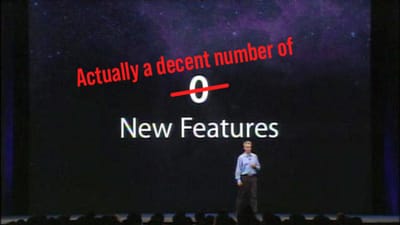The "Attention Challenge" for Games on the Apple TV
Ben Thompson on Apple TV gaming: (subscribe for the full article)
I think the games market has already bifurcated between the high-end and casual; the former won’t be tempted by the Apple TV, particularly given the fact Apple didn’t even put its most powerful processor in it nor include a real controller (and the asset streaming is suboptimal), and the push for universal apps suggests that high-priced titles aren’t a priority anyways. Casual gamers, meanwhile, have long since moved their gaming to their smartphones; I suspect any Apple TV gaming is likely to graduate up from the phone, not down from the consoles.
At the same time I was reading this article, this tweet went through my timeline:
@mattbirchler Holy crap, this is gonna change everything.
Note to self: uninstall Pac-Man 256
— Richard J. Anderson (@sanspoint) September 18, 2015Everyone knows that games kill your smartphone battery. They use more processing power than just about any other app and they keep your screen on for extended periods of time. When I think about this combined with the popularity of portable power bricks and many people’s cry of “give us more battery life!” I have to wonder if this will be a reason people move some of their gaming to the TV. An Apple TV will never run out of battery.
However, I wonder how these smartphone games will scale up to a “living room” experience. If you’re playing Clash of Clans at home, I’ll bet 9 times out of 10 you also have the TV on in the background. Playing on your TV would make your smartphone games not only your main focus, but likely your only focus. Games for the PS4, Xbox One, and Wii U are built to capture and hold onto your attention to be your one and only focus, but I’m skeptical of mobile-style games achieving the same thing.
I’m also skeptical that Apple will create an App Store environment where developers can charge the amount they would need to justify dedicating the resources required to build truly engaging games. Call of Duty Advanced Warfare was released last November and has sold just over 20 million copies to date. 20 million 99¢ downloads would be pretty great for most developers, but consider that Call of Duty is a $60 game, that’s customers throwing over $1 billion back to the developer (minus retailer and platform costs, of course) and they’re glad to do it. Now look on the App Store at any game that costs more than $1.99 and see all the comments saying the game is overpriced, no matter how good it is. Great games, not just hardcore games, cost real money to make, and you need to charge real money to make them a sustainable business.

